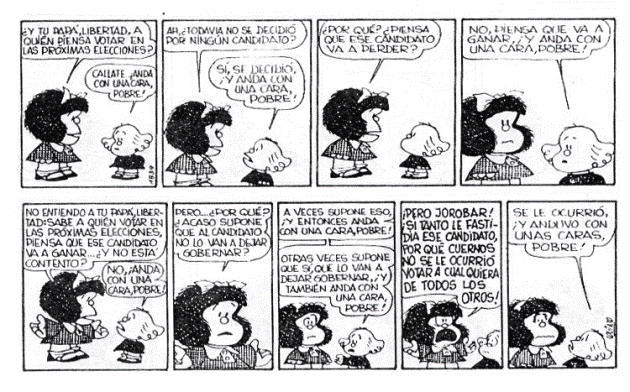 Supporters of the Cuban electoral process often cite the millions of campaign dollars spent in the United States as justification for not allowing any kind of campaigning or fund raising. But that is not quite the case. Every day there are television, radio and press reports on “the candidates of the Fatherland,” and on how to vote using ballots differentiated by color.
Supporters of the Cuban electoral process often cite the millions of campaign dollars spent in the United States as justification for not allowing any kind of campaigning or fund raising. But that is not quite the case. Every day there are television, radio and press reports on “the candidates of the Fatherland,” and on how to vote using ballots differentiated by color.
Photos of the candidates with a short biography on each one—their political activities are emphasized—can be found in large establishments in every district throughout the city. The future deputies travel to these districts—a sure sign that they do not live there—visiting workplaces, science facilities, schools and cultural centers. And if the locals are lucky, this will be the first and last time they ever see them.
Putting the entire centralized propaganda apparatus at the service of the electoral campaign costs money. I would say a lot of money.Money that is provided by that amorphous mass of “contributors” called “our working people,” who are not given details as to how their contribution will be used.
Special schools have been established in transport terminals. Am I to vote there for the candidates who will represent me? No, I must vote for them in the district where the school is based. There is no better example of demagoguery, although it has a subsidiary psychological purpose. Or is it the opposite?
In the enthusiasm to be part of an electoral system established in opposition to the bourgeoisie, the candidates do not propose a program. They do promise to be extremely loyal to the Revolution, but they are almost always inept at doing what they were elected to do. Elections have become a pantomime in which citizens take part, even when they see no value in it, with a mixture of fear and apathy. This attitude is expressed in the popular axiom: “There is no one to fix it, but there is no one to tear it down either.”
In the past I have noted that no one is really elected, but rather approved by the mysterious committee on nominations —closed nominations—which chooses a certain percentage of women, young people, blacks, and more recently religious and homosexuals, to give the appearance of diversity. It is an approach that is both artificial and disrespectful towards minorities, who are the ones feeling most unrepresented.
They have wanted to make us believe that money plays no role in politics, that our legislators receive no salary for their public service. But no one who joins the “professional cadre” lives on air. Everyone not only keep his or her former salary, but they enjoy expense-paid trips, a car with an allotment of gasoline, hard-currency vacations and other items that in Cuba count as perks and lead to a jump in their standard of living.
Meeting twice a year and expecting to resolve in three days all of this country’s problems, which pile up from one legislative session to another, is impossible. As bourgeois as he may appear, the professional official has to be effective because, if he does not fulfill the expectations of his constituents, he could end up impoverished, or even subject to prosecution
After twenty-seven years of existence, People’s Power has proven to be so ineffective that it should either be reformed or abolished.
January 30 2013
